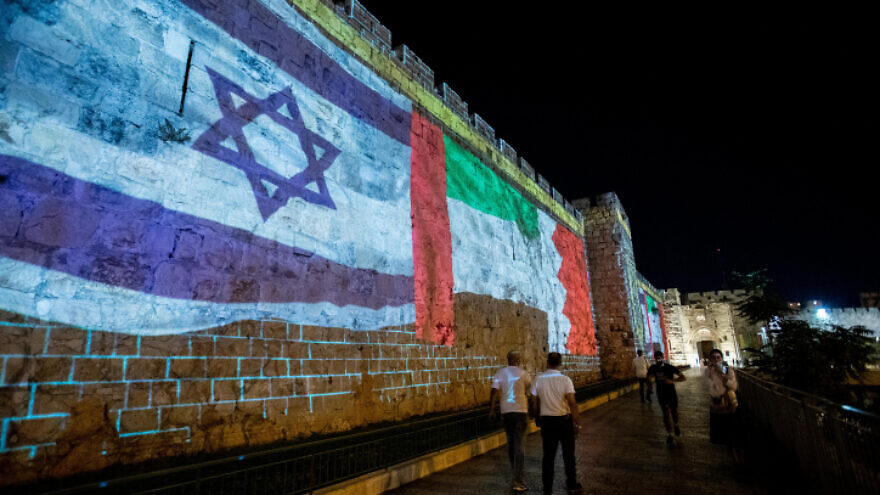The recent conflict between Israel and Hamas in the Gaza Strip emerged as the first real test for Muslim countries that established ties with Israel as part of the Abraham Accords.
“The Abraham Accords passed the test, but Israel now needs the involvement of friendly Arab states to change the status quo in Gaza in order to avoid another round of fighting in the future,” said Simon Henderson, a fellow and director of the Bernstein Program on Gulf and Energy Policy at the Washington Institute for Near East Policy.
The United Arab Emirates is ready to help advance peace efforts between Israel and the Palestinians, Abu Dhabi Crown Prince Sheikh Mohammed bin Zayed al-Nahyan said in a call with Egyptian President Abdel Fattah el-Sisi.
Nahyan expressed support for Egypt’s efforts to achieve regional stability, stressing that the UAE is ready to work with allied parties to maintain the ceasefire and reduce tensions to advance peace, UAE state news agency WAM reported on Sunday.
The Abraham Accords, which normalized relations between Israel and the UAE, Bahrain, Morocco and Sudan in the fall of 2020, put these Arab regimes in an uncomfortable position as rockets rained down on Israeli civilian population centers and the Israel Defense Forces struck back heavily in relation. It’s a rickety time as these countries need to balance their budding relationship with Israel with solidarity with the Palestinians, especially among their populations.
“The Gaza conflict has been a test for the Abraham Accords, and it is also an opportunity,” noted Henderson. “The signs at this stage are positive, but more than just nice words—or the absence of condemnation—will be required.”
This was clear during the conflict when some Arab allies of Israel did come out and condemn the actions of the Jewish state.
Saudi Arabia, which has been reported to be on its way to peace with Israel, condemned Israel’s “aggression” during the recent Gaza war, also saying that it would seek to pressure the “occupation” government of Israel during a call with Palestinian Authority leader Mahmoud Abbas.
Morocco’s King Mohammed VI said earlier this month that 40 tons of aid were being shipped to the West Bank and Gaza because of the recent violence.
Morocco also criticized “the violent acts perpetrated in occupied Palestinian territories” and voiced support for the two-state solution to the Israeli-Palestinian conflict, reported Reuters.
‘More pressure placed on Arab countries’
But was such criticism by the status quo Arab states merely lip service to the Palestinian cause when the real fear centers on radical Islamic groups and regimes such as Iran?
It appears that the condemnation was at least partly for show, as the growing technical, security, agricultural and economic ties are bound to continue between these Arab states and Israel.
Indeed, Saudi Arabia and the countries that signed on to the Abraham Accords oppose revolutionary Islamist movements and governments that seek to upend their regimes. Turkey, Iran, the Muslim Brotherhood, its offshoot Hamas and ISIS are the main threats to these countries, as well as to Jordan and Egypt, which have long had peace treaties with Israel.
As such, while these countries may have given a nod to the Palestinian cause, they are also aligned with Israel when it comes to fighting back the threat of Islamist groups like Hamas, as well as its patron, Iran.
Brandon Friedman, director of research at the Moshe Dayan Center at Tel Aviv University, told JNS, “I do not think this conflict will affect security or investment ties between Israel and the UAE or Bahrain.”
“It does, however, contain the potential to limit the scope of a range of people-to-people ties with UAE and Bahrain,” he assessed.
“If this kind of conflict happens once every decade, then I don’t think it would erode ties. But if it happens every two to three years [like 2009, 2012, 2014], then I think it does contain the potential to take a warm normalization and make it a colder one,” he said.
“It is easy to forget that Egyptian bitterness over how Israel handled the Palestinian issue in the wake of the March 1979 Camp David Peace Accords was one of the factors that contributed to making peace with Egypt a cold one,” argued Friedman.
An op-ed published in the UAE-based The National argued that until a solution to the Palestinian issue is found, the Abraham Accords “will not be complete.”
However, the author, Ebtesam Al Ketbi, also argued that the war in Gaza did not put the peace agreements at risk.
“The more that Palestinian suffering is exacerbated, the more pressure will be placed on the Arab countries that have already [signed] the normalization agreements with Israel and the more embarrassing the situation will be for them,” she wrote.
Quietly, it seems, there was Arab pressure on Hamas to stop firing rockets at Israel.
An unnamed senior UAE official told the Israeli business daily Globes in a report on May 15 that projects and investments in the Gaza Strip would not go forward as long as Hamas continued attacks against Israel.
Therefore, Israel’s security and economic ties are more valuable to the UAE, Egypt and other pragmatic Arab states than the Palestinian issue, which is a distraction in their eyes to the real threat they face from Islamist groups and Tehran.
As Gen. Abdel-Fattah Burhan, chairman of Sudan’s Sovereignty Council, said, according to MEMRI, “What is happening in Gaza is very sad […]. The normalization [with Israel] has nothing to do with the Palestinians’ right to establish their own state.”


























